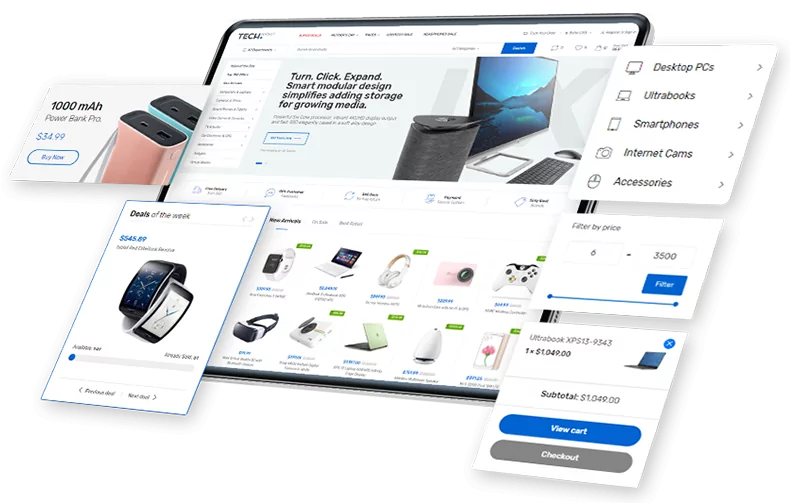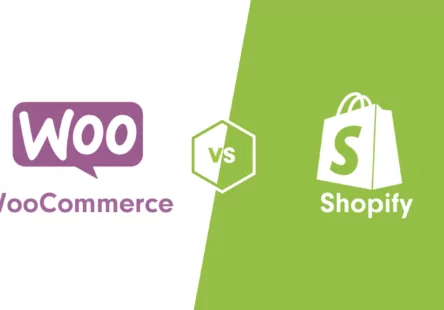Tabla de contenido
[zoomsounds id=”why-transitioning-to-online-is-important-for-retailers”]
Online shopping has been around for years. However, as of late, the playing field of e-commerce has become increasingly competitive, thus experiencing a lot of exciting developments along the way. All manner of digital stores and service providers are now making the inevitable step of taking their business online, transition from retail.
With greater convenience and flexibility, more people are heading to the internet, including mobile sites and social media, to consume content and avail services. In turn, it seems the enterprises themselves see having a business web page as well in order to adapt to the digital age.
Designing an online stores might seem like a demanding process, and for some it might well be. But both the immediate and persisting benefits of taking the step to move a business online are manifold and noticeable.
Online Store Benefits
The actual move to becoming an e-store takes time. Prior to that, however, there is a need to inform everyone of the incentives for doing so. Fortunately, those exist, and they make a pretty compelling case as you will no doubt see.
We shall get to how physical stores can mobilize their assets and branding for a transition to online business. For now, let us preface by discussing, in some detail, the specific reasons in favor of starting an online setup.
1. Easier to Reach New Customers
Online stores have the distinct advantage of catering to audiences regardless of real-world obstacles. The same is not possible with the limited reach of purely brick-and-mortar ventures, thanks to the language barriers and geopolitical differences.
Being a global village, the internet manages to connect people from all walks of life. Having achieved that and much more, it was inevitable that it would do a much better job of letting people interact without any obstacles.

Aside from international reach, online stores enjoy a much better push among various socioeconomic groups, including people that rely on digital media like older Facebook users or mobile users over DeskTop clients, as seen in younger demographics.
2. A More Financially Sound Approach
Building a physical store can be a lengthy and costly process where property must be acquired, construction must take place, and marketing must follow. Once the location starts a business, it needs to be maintained as a lasting source of profit which ironically, but logically, has its costs.
Compared to that, creating an online setup as a standalone service or a complement to a physical store is much less expensive overall. From the process of buying a domain name, and designing a server, to the process of marketing, the costs incurred here are much less of a burden.
Online business owners don’t have to worry about rent hikes, employee compensation, overhead expenses, or other financial issues that accompany opening a new physical store. For those that have an existing shop, starting an online presence is a cost-effective option.
If anything, the improved ability to connect with people through the world wide web offers branding and revenue opportunities that store owners would be missing out on if they remained solely offline. Speaking of which.
3. Heightened Marketing Capabilities
With the internet, even small or medium-sized enterprises are offered immediate and near unrestricted access to a much larger and more diverse base of potential customers. This is not that surprising since the limitations of long-distance travel and language barriers become null and void in the digital realm.
Along with the purely digital perks, this amplified availability of a target audience means that store owners’ chances of attracting customers to their physical location are also much better than before.
Between the expenses of TV ad campaigns and the general lack of efficiency in printing and distributing flyers and posters, physical businesses on their own cannot do much. Attracting customers through the internet grants marketing opportunities that are as impactful as they are economically viable.
Search engine optimization (SEO) allows web designers and online business owners to improve their search ranking prospects. This way, more people will be directed to their goods and services.
Also, marketing via social networking or media platforms opens up a more easily navigable path to making others aware of your brand and what is in it for them as customers.
4. More Resources
Online businesses don’t just have better access to prospective audiences but also enjoy a more varied selection of tools and marketing methodologies to advance their business. We just discussed the impact that social media marketing and SEO can have. But that merely scratches the surface.
For existing services, customer reviews and rebranding through positive impressions, media galleries, promotional videos, and blog posts offer remarkable, previously unavailable promotional capabilities to business owners.
With greater favorable impressions, content-based marketing also helps establish a certain wide-ranging reputation for digital stores as reliable businesses, even the more obscure ones.
5. Business That Does Not Rest

Unlike a great deal of physically-operating businesses, digital stores aren’t encumbered by the concept of closing hours. E-commerce activity is a constant and never-ending stream of revenue that store owners can exploit to their maximum benefit.
Even brick-and-mortar services that run 24/7 enjoy fewer businesses since they cater to a local audience. People in their area code need to sleep, which affects the flow of business. Online stores serve international audiences living in more active time zones, leading to steady customer engagement.
The automated nature of online business means that no one needs to be paid for working tiring shifts to keep visitors entertained, making e-commerce stores even more financially sound and profitable.
6. Sustainability
Despite the greater audience reach and revenue channels over physical stores, online activities are far less difficult to maintain, fund, and operate.
While brick-and-mortar stores come with a much greater need for quality control as well as the burden of supporting employees, with online businesses, the process of designing and implementing an interface is much easier by comparison.
Plus, maintenance expenses, even by outsourcing to a third party, are more manageable and result in better creative control for online stores.
7. A Dynamic Experience for Clients
Brick-and-mortar stores have their appeal, but due in large part to the reasons we have already discussed, that is fairly limited. Customers sometimes want an experience that is more tailored to their needs and preferences.
Products and goods hosted on online stores are available in greater stock and variety. If they are not, buyers are notified of future updates. If they aren’t satisfied with their purchase or experience any confusion, e-stores provide a better system for sharing ratings and feedback.
Additionally, online stores are better suited to offer promotional deals and discounts to consumers for certain goods. And of course, there is the issue of delivery and payment services, as many physical stores suffer due to not providing conveyance or diverse payment options to clients.
Taking Your Business Online – A Brief Guide
To transfer a company or service provider from its physical branches to a wider virtual target market, a great deal of consideration must take place beforehand. Given what is at stake here, having a plan is not something you can skip or gloss over.
In order to take your business online, there are a number of big decisions you need to make and factors to consider. We recognize that every business has different needs and priorities, so we have listed the most important ones for any type of business to take into consideration, starting with.

Where to Host Your Online Store
Finding the perfect platform to start your online business is a vital first step in initiating an e-store. Content management systems like WordPress are usually the perfect arena for beginners and experienced developers alike.
The reason is that they provide all the tools necessary for running a smooth online business. A wide selection of website interfaces, plugins, and e-commerce toolkits are just a few of the important factors that need to be taken into account here.
On top of that, much of the decision-making relies on what we discussed above. Specifically, to reap the benefits of an online store, it needs to be beneficial over its brick-and-mortar counterpart as well as generally a step in the right direction.
- On that note, you need to ensure the following things in regards to your platform of choice.
- The host platform must not take long to optimize.
- Adding security features, payment mechanisms, and other conveniences should be easy.
- As the business grows, the store website must receive adjustments well.
- The host server must support an interactive site with flexible, customizable features.
- Hosting a website must be overall more profitable, including after maintenance, security, payroll, etc.
- It should come with staff-friendly tools and resources like dashboards and management pages.
- It should provide a user-oriented and mobile-friendly experience.
- It needs to support the promotion, campaigns via social media, SEO adjustments, etc.
Transferring Goods to Store Lists
An important part of moving to an online business is knowing what (and how) to sell and what not to distribute online. When dividing your inventory for this process, you need to make accommodations for preparing goods for travel.
Also, due to various guidelines and safety restrictions, not all goods can move across national or international borders. Those need to be kept off the list of web store items as a result.

Online Store that sells!
Do you need a redesign or a new website for selling online?
Complete solution for retail and wholesale. Great UX/UI designers, experienced programmers and high emphasis on testing. If you are looking for a professional partner for your business in the online world, contact us!
As for products that are safe to travel, your job would be to focus on the ones that are more in demand. Less popular items need to be made available through the web portal on an as-needed basis. Generally, more profitable products are the better choice for online sales and are more likely to perform better through a list view, as WeLoveWeb claims.
Establishing a Mechanism for Shipments
With online stores, the point of service experience is much different and must be structured as such. For delivering to remote consumers, the choice to have your store’s own delivery service is not a recommended choice. Yes, you might have better control over the process, but the running costs do not make it worthwhile.
By contrast, partnering with an existing delivery service and shipping client is a more sustainable approach that benefits everyone involved. For the store, this means that they are no longer burdened by the costs and responsibility of packing and delivering.
For ideal results, businesses should seek reputable shipping services that practice safety and quality control guidelines. If there are multiple options, weigh them and choose the one that is either logistically or competitively superior.
Many shipping clients are supported by existing plugins in e-commerce hosting systems, making them easier to integrate into store websites than others.
Interacting With the Audience
Stores and businesses often struggle to update customers with new offers and products. With online stores, that all-important step must become much easier to accomplish.
Keeping your regulars engaged has to be routine and far-reaching as a business practice. Online businesses, as we’ve mentioned earlier, have much better resources and platforms for making that happen.
Point-of-Sale Systems
A reliable checkout system often paves the quickest path in your journey to becoming an online store, and point-of-sale (PoS) systems offer the ideal platform.
This way, a lot of your inventory tasks, financial calculations, and various transactions can be completed, recorded, and archived immediately and at once.
Once again, success depends on your ability to pinpoint and select the ideal content management system to handle your needs and aid your business’s transition to the web.
Adapting Businesses To A New Age
Even with the digitization of our commercial activities, the point of this article is not to imply that physical retail is going anywhere. As long as people have the chance to peruse product lists in real-time, their appeal will last.
The fact of the matter is, though, that competing in today’s market ecosystem is not really an option without preparing for a world where e-commerce is increasingly dominant. That sometimes means combining the capabilities of physical and online stores through online ordering and curbside or take-away-inspired pickup.
In any case, given what we have discussed, having a digital store is no longer about “why?”. We have already established why any business that does not already have a digital PoS needs one ASAP. The real question is how stores can do that, and to be fair, and we have covered that as well. Hopefully, this was a helpful read to anyone interested in diving into e-commerce.







